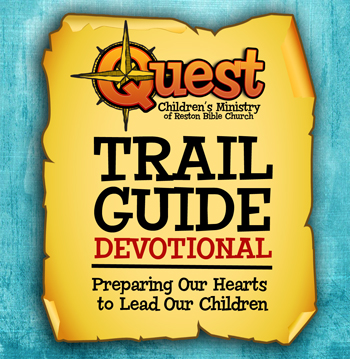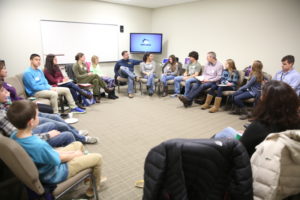TRAIL GUIDE: Forgive and Pray
 The “Trail Guide” devotional is used by our adult leaders of grade school groups in Quest as a way to prepare their hearts and minds for the topics we will be covering with the children on the weekend. We have made them available here to help our parents of grade-schoolers engage with their children around the topics we are discussing and also for anyone else that might be blessed by following along.
The “Trail Guide” devotional is used by our adult leaders of grade school groups in Quest as a way to prepare their hearts and minds for the topics we will be covering with the children on the weekend. We have made them available here to help our parents of grade-schoolers engage with their children around the topics we are discussing and also for anyone else that might be blessed by following along.
EXTREME MAKEOVER, Unit 2, Section 2, Lesson 2: Forgive & Pray
The church is made up of people. As people being transformed into the image of Christ, we are by definition not finished products. This leaves us open to mistakes or offenses committed against one another. The question is not whether we offend one another but rather when it happens how do we respond in a way that is not of this world?
Forgiveness and prayer – this is the model we have in Christ. If we behave as the world behaves, we diminish our witness to the lost, inflict pain on the body of Christ, and damage our own walk with the Lord. As we take a look at the topic of forgiving one another and praying for one another, take personal inventory of your relationships in the church. Are you actively praying for those with whom God has brought you into relationship within the body? Are we keeping short accounts with our brothers and sisters in Christ? As you prepare for this week with the children, I encourage you to read the two articles on forgiveness and prayer, keep your kids before the Lord on your knees, and ask the Father to continue your extreme makeover in this critical area of our spiritual lives. (CLICK HERE TO DOWNLOAD THE ARTICLES.)
Thank you for giving to the Lord by serving His children. Your offering is making an eternal impact.
”Forgiveness does not mean ignoring what has been done or putting a false label on an evil act. It means, rather, that the evil act no longer remains as a barrier to the relationship.” ~ Martin Luther King, Jr.
“Here is my command. Love each other, just as I have loved you. No one has greater love than the one who gives his life for his friends. You are my friends if you do what I command.” – John 15:12-14
MEDITATING ON THE WORD:
Acts 4:33-35 | Phil 2:25
1 Corinthians 16:13-18
Fun, Fun, Fun at Family Fun Night

Over the upcoming Spring Break, a missions team (led by Mike Meyers and Jason Goetz) will jet down to Brazil to help host a Vacation Bible School program for up to 200 children of the Terena Indian Tribe. On Friday February 20, the RBC Family-Quest Brazil team hosted a Family Fun Night at Reston Bible Church as a team-building exercise.
About 230 people (55 families!) came out despite record cold temperatures to play games, make crafts, watch movies, and devour pizza, popcorn, and ice cream. The mission team had its first chance to work together on a project, and it was wonderful to hear our younger volunteers ask (after having served for 5 hours), “Is there anything else I can do?” We were also happy to hear people say, “When are you doing this again?”
Special thanks to:
– The Don’s Pizza for giving us a great deal on our dinner
– Our volunteers who served alongside of us even though they are not going on the trip
– Our church family for coming out to support us. We hope you had FUN!
If you would like to support the team’s mission financially you can do so by clicking HERE (this link will take you to the Open Arms Worldwide website) and then following the instructions at the top of the page.
 You can also support the team by eating out at The Jukebox Diner (46900 Community Plaza, Sterling VA, 20164) on Sunday, March 8th. For the whole day, (breakfast, lunch, or dinner) you can leave your receipt in the jar at the register and 10% of your bill goes to support our mission team!
You can also support the team by eating out at The Jukebox Diner (46900 Community Plaza, Sterling VA, 20164) on Sunday, March 8th. For the whole day, (breakfast, lunch, or dinner) you can leave your receipt in the jar at the register and 10% of your bill goes to support our mission team!
TRAIL GUIDE: Serve One Another
 The “Trail Guide” devotional is used by our adult leaders of grade school groups in Quest as a way to prepare their hearts and minds for the topics we will be covering with the children on the weekend. We have made them available here to help our parents of grade-schoolers engage with their children around the topics we are discussing and also for anyone else that might be blessed by following along.
The “Trail Guide” devotional is used by our adult leaders of grade school groups in Quest as a way to prepare their hearts and minds for the topics we will be covering with the children on the weekend. We have made them available here to help our parents of grade-schoolers engage with their children around the topics we are discussing and also for anyone else that might be blessed by following along.
EXTREME MAKEOVER, Unit 2, Section 2, Lesson 1: Serve One Another
“You Should Do As I Have Done For You” – Jesus
The dusty and dirty conditions of the region necessitated the need for foot-washing. Although the disciples most likely would have been happy to wash Jesus’ feet, they could not conceive washing each others’ feet. This was because in the society of the time, foot-washing was reserved for the lowliest of menial servants. Peers did not wash one another’s feet, except very rarely and as a mark of great love. Luke points out (22:24) that they were arguing about who was the greatest of them, so that none was willing to stoop to wash feet. When Jesus moved to wash their feet, they were shocked. His actions serve also as a symbol of spiritual cleansing (vs. 6-9) and a model of Christian humility (vs. 12-17). Through this action Jesus taught the lesson of selfless service that was supremely exemplified by His death on the cross.
The foot-washing was an example, a pattern. Many groups throughout church history have practiced literal foot-washing as a church ordinance. However, present culture in many lands does not call for the need to wash dust from the feet of one’s guests. Whereas the Lord’s Supper was practiced by the early church, it apparently did not practice foot-washing as an ordinance in church gatherings. This passage emphasizes inner humility, not a physical rite. A Christian widow’s practice of “washing the feet of the saints” (I Tim. 5:10) speaks not of her involvement in a church ordinance but of her humble slave-like service to other believers. Not to follow the example of Jesus is to exalt oneself above Him and to live in pride. “No servant is greater than his master” (cf. John 12:26).
Take this time for some introspection. Have you ever, consciously or unconsciously, considered yourself “better” than someone else? Would you gladly clean the toilets in the church building or are your gifts or your “position” above that sort of thing? What was Jesus’ perspective on this subject? If we are His body then this is critical information.
Recommended Resource: Manners and Customs of the Bible by J.I. Packer & M.C. Tenney.
“Here is my command. Love each other, just as I have loved you. No one has greater love than the one who gives his life for his friends. You are my friends if you do what I command.” – John 15:12-14
MEDITATING ON THE WORD:
Galatians 5:13; 6:2
Romans 12:2-3 | James 2:1-12
Philippians 2:1-7
From the Field: Where’s the Ban-yay-ro?

 Twenty-two members of Reston Bible Church, led by Mike Meyers and Jason Goetz, are preparing to jet down to Brazil over spring break to help host a Vacation Bible School (VBS) for up to 200 children of the Terena Indian Tribe. The mixture of parents and kids from 5th grade and up met for the second time last week to get to know each other, learn important words like ban-yay-ro (bathroom), and figure out how to make this VBS absolutely amazing.
Twenty-two members of Reston Bible Church, led by Mike Meyers and Jason Goetz, are preparing to jet down to Brazil over spring break to help host a Vacation Bible School (VBS) for up to 200 children of the Terena Indian Tribe. The mixture of parents and kids from 5th grade and up met for the second time last week to get to know each other, learn important words like ban-yay-ro (bathroom), and figure out how to make this VBS absolutely amazing.
A few numbers from the meeting:
7 pizzas consumed
2 cups (of water) spilled
5 sentences learned in Portuguese
2 worship songs sung
5 craft projects picked
And a zillion other details discussed
WANT TO LEARN MORE ABOUT OUR FAMILY MISSION TO BRAZIL? Join us for Family Fun Night on February 20 from 6pm to 10pm as we play games, eat, and have a bonfire on Mount Minter. Where else can you go for dinner, friends, and hours of fun for just $10 and get to hear about our mission to Brazil? Hope to see you there!
TRAIL GUIDE: Loving Your Family
 The “Trail Guide” devotional is used by our adult leaders of grade school groups in Quest as a way to prepare their hearts and minds for the topics we will be covering with the children on the weekend. We have made them available here to help our parents of grade-schoolers engage with their children around the topics we are discussing and also for anyone else that might be blessed by following along.
The “Trail Guide” devotional is used by our adult leaders of grade school groups in Quest as a way to prepare their hearts and minds for the topics we will be covering with the children on the weekend. We have made them available here to help our parents of grade-schoolers engage with their children around the topics we are discussing and also for anyone else that might be blessed by following along.
EXTREME MAKEOVER, Unit 2, Section 1, Lesson 3: Loving Your Family as Christ Loves the Church
As we started this section on loving our neighbor in the family, or “Family Ties”, we focused on how, in His wisdom, God created for us a physical picture of the spiritual family He had in mind for all who would call on the name of Christ. We’ve also looked at how that earthly family, whether biological or adopted, is a training and proving ground – bettering God’s children for life with our spiritual brothers and sisters.
This week, we’ll discuss caring for our earthly family, placing priority on them, and setting them before ourselves. This is yet another mirror image of what we’ll discuss in our next section, loving your neighbor in the church… God’s family. I pray that as you prepare this week you will take time to consider the relationships you maintain with your siblings and other relatives. How is Christ reflected in those relationships? For me, these questions have been convicting, comforting, and inspiring at the same time. Hopefully you will be challenged by God’s word as well.
What do you value? Read this “Dear Abby” letter and then replace “Mom & Dad” with other family relations.
Dear Abby: I am the most heartbroken person in the world. I could always find the time to go everywhere else, but never the time to go visit Mom and Dad. They sat at home alone and loved me just the same. It’s too late now to give them those few hours of happiness. I was too selfish and too busy to give. Now when I go to their graves and see the green grass above them, I wonder if God will ever forgive me for the heartaches I must have caused them when they were still alive. I pray to God that those who still have their parents to visit, do so, and show their love and respect while there is still time, for it’s later than you think. — TOO LATE.
“Everyone should provide for his own relatives. Most of all, everyone should take care of his own family. If he doesn’t, he has left the faith. He is worse than someone who doesn’t believe.” – 1 Timothy 5:8
MEDITATING ON THE WORD:
Matthew 15:4-6
Matthew 25:39-40
TRAIL GUIDE: Honor Your Parents
 The “Trail Guide” devotional is used by our adult leaders of grade school groups in Quest as a way to prepare their hearts and minds for the topics we will be covering with the children on the weekend. We have made them available here to help our parents of grade-schoolers engage with their children around the topics we are discussing and also for anyone else that might be blessed by following along.
The “Trail Guide” devotional is used by our adult leaders of grade school groups in Quest as a way to prepare their hearts and minds for the topics we will be covering with the children on the weekend. We have made them available here to help our parents of grade-schoolers engage with their children around the topics we are discussing and also for anyone else that might be blessed by following along.
EXTREME MAKEOVER, Unit 2, Section 1, Lesson 2: Honor Your Parents (The Bridge)
“Honor your father and your mother, so that you may live long in the land the Lord your God is giving you.” Exodus 20:12.
‘Honor’ is a word that has fallen out of favor in our modern western culture. This is particularly the case when it comes to the giving of honor to parents by children, whether grown or still at home. The fifth command is the first of six commands that God gives concerning our behavior towards our fellow man. It is the “bridge” between the commands about loving God and those about loving our neighbor. So it is fitting that in our study we will begin here. This week, we will look at what it means to “honor” our parents. We’ll consider how this is a picture for how children relate to their Heavenly Father. As you prepare this week take some time to consider how you “honor” your own parents, even if they may not be very “honorable.”
As you prepare your heart and mind for this week’s lesson, take a fresh look at some of these verses and make a mental note of the ways in which we can honor our parents, our elders, and everyone else. God puts much value – or weight, as the root of the Hebrew word for “honor” indicates – on age and the elderly. Scripture is clear that special deference and care must be given to our parents and elders, especially those within our own family. Consider the ancient Chinese culture, which places great value on honoring parents, and their longevity as a civilization when you read anew this “command with a promise.”
“Everyone should provide for his own relatives. Most of all, everyone should take care of his own family. If he doesn’t, he has left the faith. He is worse than someone who doesn’t believe.” – 1 Timothy 5:8
MEDITATING ON THE WORD:
Lev 19:3 | Eph 6:1-4 | Prov 1:8
Prov 23:22 | Matt 15:4-6
1 Tim 5:8 | Lev 19:32 | Deut 5:16
TRAIL GUIDE: God’s Family & Mine
 The “Trail Guide” devotional is used by our adult leaders of grade school groups in Quest as a way to prepare their hearts and minds for the topics we will be covering with the children on the weekend. We have made them available here to help our parents of grade-schoolers engage with their children around the topics we are discussing and also for anyone else that might be blessed by following along.
The “Trail Guide” devotional is used by our adult leaders of grade school groups in Quest as a way to prepare their hearts and minds for the topics we will be covering with the children on the weekend. We have made them available here to help our parents of grade-schoolers engage with their children around the topics we are discussing and also for anyone else that might be blessed by following along.
EXTREME MAKEOVER, Unit 2, Section 1, Lesson 1: God’s Family & Mine
God uses many metaphors (parallels) in the Bible to describe how He relates to us, how He relates to the church, and how we relate to one another. One of these is the metaphor of “God’s family.” In this picture, God is the parent and we the children. Jesus is our brother, and we the church, saved by grace through faith, are the adopted brothers and sisters in this family (Ephesians 1:5, Galatians 3:26, John 1:12-13). How does the Father want us to love our family? To answer this question we must first look to how He has loved us and also how the Son, our adopted brother, has loved us. Jesus said, “Love one another. As I have loved you, so you must love one another.” It is at the source of divine love that we must begin and end our quest.
As you prepare your heart and mind for this week’s lesson, take a fresh look at some of these verses and make mental note of the ways in which our family life parallels our life in God’s family. What can we learn about how we relate to God and what insights might we gain about how God views us as His children, through the lens of the human family? We as individuals were created in the image of God. We as families reflect that likeness to an even greater degree.
“Everyone should provide for his own relatives. Most of all, everyone should take care of his own family. If he doesn’t, he has left the faith. He is worse than someone who doesn’t believe.” – 2 Timothy 5:8
MEDITATING ON THE WORD:
Jn 19:25-27 | Eph.1:5| Mal 4:5-6
Galatians 3:26 | John 1:12-13
1 Tim 5:4-8 | Eph.6:1-4
TRAIL GUIDE: The Purpose of Strengths
 The “Trail Guide” devotional is used by our adult leaders of grade school groups in Quest as a way to prepare their hearts and minds for the topics we will be covering with the children on the weekend. We have made them available here to help our parents of grade-schoolers engage with their children around the topics we are discussing and also for anyone else that might be blessed by following along.
The “Trail Guide” devotional is used by our adult leaders of grade school groups in Quest as a way to prepare their hearts and minds for the topics we will be covering with the children on the weekend. We have made them available here to help our parents of grade-schoolers engage with their children around the topics we are discussing and also for anyone else that might be blessed by following along.
EXTREME MAKEOVER, Section 4, Lesson 3: The Purpose of Strengths
Remembering back to our first lesson on strength we said that, “First, He is the fountainhead of our strength. Second, He stands ready to renew our strength if we will seek Him, trust Him, and wait on Him. Third, God gives us strength not for our own selfish interests or nonsense but to glorify Him and do the good works of the Kingdom that He has prepared in advance for us to walk in.”
Let’s talk this week about that last point. The Bible teaches that as followers of Christ we have been given the right to be called “children” of God. It goes on to teach us to imitate God, “as dearly loved children.” In what ways can we imitate God? The Living God is in His essence a savior and defender. Psalm 68 says He is a “Father to the fatherless and defender of widows.”
Psalm 34 tells us that He is “close to the brokenhearted and saves those who are crushed in spirit.”
Psalm 82 extends these duties to us. “Stand up for those who are weak and for those whose fathers have died. See to it that those who are poor and those who are beaten down are treated fairly. Save the weak and those who are in need.”
Do not make the mistake of thinking that this only applies to physical oppression either. Jesus says of himself (and by extension his followers), “The Spirit of the Lord is on me, because he has anointed me to proclaim good news to the poor. He has sent me to proclaim freedom for the prisoners and recovery of sight for the blind, to set the oppressed free.”
The Spirit of the Lord is upon all of His children now and in His strength we are to be imitators of our Heavenly Father. The fact that Jesus immediately moved from loving God to loving our neighbor isn’t coincidence. This makeover isn’t to be kept to ourselves. God saved us, but left us in the world for a reason. We are being made over for a purpose! Let’s get to it!
“The Lord is my strength and my shield. My heart trusts in Him, and I am helped.” -Psalm 28:7a
MEDITATING ON THE WORD:
Heb 13:16 | Phil 2:4 | Lk 6:38 | 1 Jn 3:17
Gal 6:2 | Rom 15:1 | Eph. 2:10
TRAIL GUIDE: Know Your Strengths
 The “Trail Guide” devotional is used by our adult leaders of grade school groups in Quest as a way to prepare their hearts and minds for the topics we will be covering with the children on the weekend. We have made them available here to help our parents of grade-schoolers engage with their children around the topics we are discussing and also for anyone else that might be blessed by following along.
The “Trail Guide” devotional is used by our adult leaders of grade school groups in Quest as a way to prepare their hearts and minds for the topics we will be covering with the children on the weekend. We have made them available here to help our parents of grade-schoolers engage with their children around the topics we are discussing and also for anyone else that might be blessed by following along.
EXTREME MAKEOVER, Section 4, Lesson 2: Know Your Strengths
“Finally, be strong in the Lord and in the strength of His might” There are many wonderful theological messages to be gleaned from the account of David’s defeat of Goliath. One message that should not be taken from it, however, is that David was a skinny kid, unprepared for battle, who despite his overconfidence was used by God to miraculously defeat an experienced warrior. Many times, the way we teach this to children leaves them with the idea that they to can face the metaphorical “giants” in their lives if they just believe. Let’s take a closer look at the account before we get the children in our care metaphorically body slammed by their giants.
The key to this account is not knowledge of God and His covenant promises to Israel. We know that King Saul and the soldiers of Israel would have known well these promises. So David’s advantage was not superior knowledge. What David had that set him apart was experience with God. David makes the case to Saul when he says, “The Lord who delivered me from the paw of the lion and from the paw of the bear, He will deliver me from the hand of this Philistine.” David had high confidence of victory because his experience with God had shown him that God was with him. But it should not be missed that David had significant skills and strengths. We know that David was a shepherd, and from our understanding of the Ancient Near East, we know that one tool of a shepherd for protecting his flock was the sling. We also know from scripture and other sources that a skilled slinger could be deadly accurate at distances of 250 meters (nearly 3 football field lengths!) Here is the math. David had been given strength and skill by God plus David knew God’s promises plus David had experienced God’s faithfulness equals one headless Philistine warrior.
Our children need to know God, know and develop the strengths He has given them, and put those into action to experience God’s faithfulness. Strength that comes from God can be trusted absolutely. That is a formula for changing the world for Christ.
Just for fun: Watch this Israeli sling demonstration on YouTube. You will never read David and Goliath the same
way again. http://youtu.be/xwlZJ5IlN68
“The Lord is my strength and my shield. My
heart trusts in Him, and I am helped.”” -Psalm 28:7a
MEDITATING ON THE WORD:
Matt 25:14-30 | Eph 6:10
Ps.139:14 | 1 Cor 10:31
Col 3:17,23 | 1 Samuel 17
TRAIL GUIDE: Strength Training
 The “Trail Guide” devotional is used by our adult leaders of grade school groups in Quest as a way to prepare their hearts and minds for the topics we will be covering with the children on the weekend. We have made them available here to help our parents of grade-schoolers engage with their children around the topics we are discussing and also for anyone else that might be blessed by following along.
The “Trail Guide” devotional is used by our adult leaders of grade school groups in Quest as a way to prepare their hearts and minds for the topics we will be covering with the children on the weekend. We have made them available here to help our parents of grade-schoolers engage with their children around the topics we are discussing and also for anyone else that might be blessed by following along.
EXTREME MAKEOVER, Section 4, Lesson 1: Strength Training
What is strength? How is the word used in scripture? It can mean our physical strength or energy, strength of character, strength of the will, perseverance, capacity or ability to perform work, or emotional strength. These are all different aspects of strength, but they all have two things in common: their source and their purpose.
“You may say to yourself, “My power and the strength of my hands have produced this wealth for me.” But remember the Lord your God, for it is he who gives you the ability to produce wealth, and so confirms his covenant, which he swore to your ancestors, as it is today.” (Deuteronomy 8:17-18)
“If anyone speaks, they should do so as one who speaks the very words of God. If anyone serves, they should do so with the strength God provides” (1 Peter 4:11)
So what is it that God teaches us about strength? First, He is the fountainhead of our strength. Second, He stands ready to renew our strength if we will seek Him, trust Him, and wait on Him. Third, God gives us strength not for our own selfish interests or nonsense but to glorify Him and do the good works of the Kingdom that He has prepared in advance for us to walk in. In the coming weeks, let us help the children to understand that God, and only God, deserves all of our strength.
“The Lord is my strength and my shield. My
heart trusts in Him, and I am helped.”” -Psalm 28:7a
MEDITATING ON THE WORD:
Deut 8:17 |1 Chron. 29:12
Phil 4:13 | Is. 41:10
2 Thess 3:3 | Is.40:27-31

